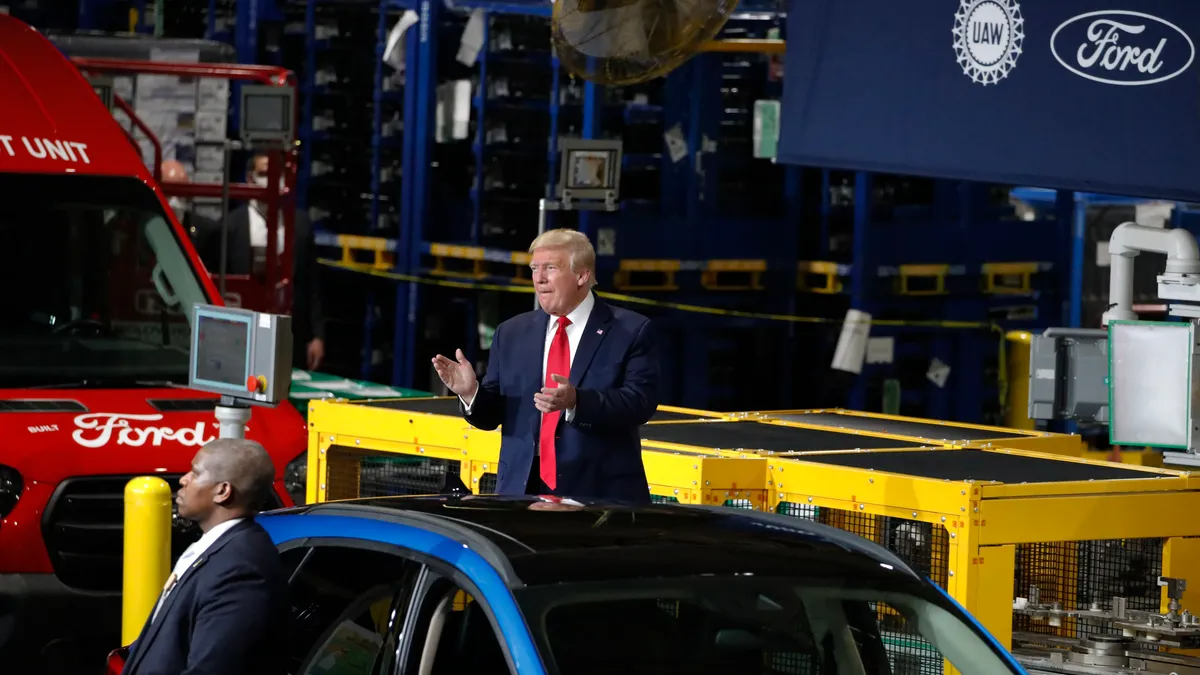
President Trump Declares 'Liberation Day' with New Tariffs
On what he referred to as "Liberation Day," President Donald Trump made an impactful announcement in the White House Rose Garden, where he unveiled a significant policy shift involving new tariffs aimed at multiple nations. The centerpiece of this announcement included a 10% minimum tariff on imports and a striking 25% tariff on foreign automobiles. This bold move aims to restore jobs and manufacturing to the U.S., particularly in regions heavily reliant on the automotive sector.
Local Auto Workers' Response to the Tariff Announcement
Among the attendees at the event were approximately 20 auto workers, including notable representatives from Michigan Assembly Plant in Wayne. Nick Nabozny, Geoff Booth, and Brendan Fluker were among those present, with Fluker expressing his disbelief and excitement at witnessing such a pivotal moment in automotive policy. "To be part of this moment, holding the pen used to sign the tariffs, was beyond anything I imagined," he stated.
The Potential Economic Impact of Tariffs
While the announcement has evoked optimism among some local auto workers, industry analysts express significant concerns about the economic repercussions. John McElroy, an analyst in the automotive sector, cautioned, "You can't implement a 25% tariff on cars and parts without expecting a rise in prices. This could translate to higher costs for consumers, which may subsequently lead to decreased sales in the automotive market." If car sales were to decline, McElroy warns, even potential gains from brought-back production could be negated.
Concerns from Both Sides of the Border
As reactions poured in, Canadian industry experts also chimed in on the implications of this tariff strategy. Flavio Volpe, President of the Automotive Parts Manufacturers Association in Canada, expressed skepticism, predicting that the American auto sector, American workers, and consumers will bear the brunt of these tariffs. "While it might seem self-serving for a Canadian to say this, our industries are tightly interlinked," he stated, underscoring the inevitable ripple effects that these tariffs could unleash across the North American automotive market.
Linking Tariffs to Future Mobility Trends
As auto workers and analysts navigate the implications of this tariff announcement, a broader context unveils the shift towards electric vehicles and sustainable transit solutions. Many Michigan car dealerships are already pivoting towards electric and hybrid vehicle sales, reflecting a growing trend in consumer preferences. With this increased focus on sustainability, it compels the industry to strategize how new tariffs might influence the growth of electric vehicle infrastructure, such as Michigan EV charging stations, which are critical for accommodating future trends.
Future Predictions: Tariffs Impact on Local Transit
As Metro Detroit's community processes the announced tariffs, there are important considerations regarding public transit, vehicle maintenance, and overall mobility. Local transit professionals are bracing for potential price shifts impacting Detroit's public transit systems and personal vehicle owners alike. Transit managers must recalibrate operational budgets in light of potentially inflated vehicle and parts prices.
Empowering the Community Through Understanding
With these catalytic changes in the automotive landscape, residents should stay informed about the evolving dynamics of their local automotive market opportunities. From navigating Detroit traffic congestion and understanding the implications of Detroit transportation policy to fostering decision-making around Detroit commuter tips and vehicle purchases, there has never been a more essential time for community engagement in these crucial issues.
The announcement of new tariffs represents a significant intersection of politics and local automotive industry futures. As various stakeholders in the Metro Detroit region come to terms with the economic consequences of these tariffs, the potential increased costs and market fluctuations may well reshape the way residents purchase, maintain, and utilize their vehicles. Now, more than ever, informed consumer choices and proactive community involvement will determine the trajectory of the industry going forward.
 Add Row
Add Row  Add
Add 



 Add Row
Add Row  Add
Add 
Write A Comment